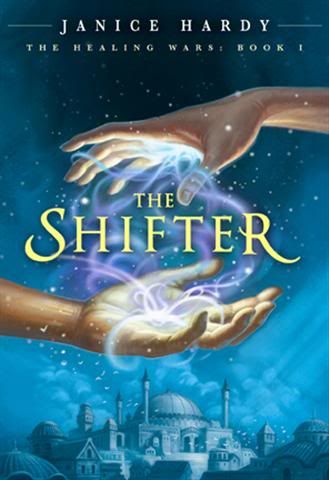Another Inkpot recommendation that I enjoyed more than I expected. Actually, as I was looking at Amazon (I'm horrible at remembering character names and almost always have to look them up) I found out that the second book in this series is already out! Sadly neither of the libraries near me seem to have a copy so no idea when I'll be able to read it but I will be keeping an eye out for it now.
The Shifter The Healing Wars: Book 1 by Janice Hardy
For a story about people literally putting pain into each other this is a pretty lighthearted cover. It's not at all what I would have done but I really do like what they did. The colors work nicely, I like the movement on the page, it's actually a really pretty picture.
Summary: In the city of Geveg there are people (healers) who can erase your pain and completely heal any injury you might have by taking it into their own bodies. There aren't many of them now, as one would expect in a country on the losing side of a war and now occupied but, as opressed as the natives are, they get by. But there's a darker side to this healing, not only are there pain merchants who buy the pain off those too poor to go to healers but there are also the rare people, like Nya, who can't get rid of the pain they gather and can only push it onto other people instead. With another war looming on the horizon she's terrified that she'll be taken as a human weapon but with trouble brewing at home she won't be able to keep her talent a secret forever.
The Good: I've kinda seen the "healing as a weapon" idea explored before but only briefly (it reminds me a lot of waterbending in Avatar: The Last Airbender actually, specifically the bloodbending episode). So it's a very unique premise and the setting was well thought out too*. One thing that really caught me by surprise was how large the core cast ended up being at the end. Most YA books I read have a core cast of two to five characters but this book had more like seven or eight by the end and all were reasonably fleshed out and none of the characters existed just to antagonize the others or provide a love interest. The plot moved at a quick pace with enough twists and explantions to keep it together so no problems there. Finally, like Starcrossed actually, I found Nya to be a much more sympathetic protagonist than I expected and she was able to explain very well why she was making the morally questionable choices she was.
The Bad: The book cover says this is for 9-12 year olds (so, 4-6th grade) and the School Library Journal (on Amazon) lists it for grades 8-10. If this is what 10 years are reading today dang, they are way more intense than I was back then, I remember being seriously freaked out by The Giver when I was 12**, and I'd put this book at around 7-9 grade myself. So, not a bad thing about the book per-say but just a heads up (also, Nya is 15 which should be another clue that a nine year old would be a little young for the book). As for actual problems with the book, it almost subverted the "hero has slightly different powers from the rest which makes them ultra-special"but ended up using them in a deus ex machina in the end and I'm having a hard time seeing what the series is trying to accomplish in the end. I would guess it probably involves ending a war/freeing Geveg but that seems a little grand. The second book has a lot to live up to and a lot to prove, let's hope it's as good as the first!
Huh, as I was browsing the other user reviews on Amazon I came across one or two people who didn't like the political undertones in Shifter (and by that I mean, it's a city, of course it has politics in it) and called them confusing. That threw me, the politics were pretty straightforward actually and this makes me think that we need more books with politics as subplots in them. I mean, if people are getting confused by the fairly basic level of politics in here, plus the general attitude among teenagers/young adults about politics ("I'mnottalkingaboutitI'mnottalkingaboutitI'mnottalkingaboutit, but let me state my opinion first without any room for discussion!") then yes, we really need more politics in books, not less.
*I'm starting to see more books these days set after a war rather than during one and I prefer the after the war setting just because I think it has more potential to be interesting, more issues to deal with and just a richer setting.
** I was going to make a comment about being an easily freaked out kid but after thinking about it, no, that killing the babies scene is just as disturbing to me now as it was back then. Think that's one of the few times I've broken down crying after reading a book actually, although The Giver is really a good book that middle schoolers should read.
